|
|
|
Sort Order |
|
|
|
Items / Page
|
|
|
|
|
|
|
| Srl | Item |
| 1 |
ID:
192064


|
|
|
|
|
| Summary/Abstract |
The police agency is an important institution that deals with the safety and security of the inhabitants of the country and with corrupt practices that affect the fiscal and public morale. That is why the appointment of an independent police commissioner, who executes his/her mandate without any fear or favour, is critical. In this study, an analysis of documents on the appointment of police commissioners in South Africa was conducted. After four successive police commissioners failed to complete their tenure because of either corruption or incompetence, this study is an attempt to determine the suitable criteria that can be used to appoint a suitable commissioner. Due to geopolitics of different countries, there is no ideal method that guarantees the appointment of a suitable police commissioner, whose office is insulated from unwarranted external influence to guarantee its integrity and public trust in the police department. It is evident that the appropriateness of the appointment method is determined by the values and democratic maturity of each country. Irrespective of the method used, there is a need for such a method to be fortified by objective appointment criteria that guarantees the capability, skilfulness, integrity, honesty and professionalism of the person appointed.
|
|
|
|
|
|
|
|
|
|
|
|
|
|
|
|
| 2 |
ID:
192061
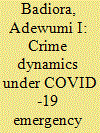

|
|
|
|
|
| Summary/Abstract |
This study examines how the COVID-19 emergency has impacted crime across different locations in Nigeria. Data were collected from a sample of residents from across Nigeria and analysed using mean ratings, percentages and chi-square. Based on the residents’ perceptions, certain crime types have decreased (e.g. home break-ins and assaults), some remain unchanged (e.g. stealing and pilfering) and others have increased (e.g. cybercrime and domestic violence). The findings show concentrations of crime in urban centres, states on total lockdown and geographical areas with poor economic indicators. The times that most crimes are perpetrated remain unchanged, except for the night time, where there has been a significant increase. Generally, individual responses to crime remain unchanged, although the use of security guards and special security door locks has changed significantly. Conversely, neighbourhood-level responses have changed significantly, particularly with the use of vigilante groups, police and military patrols as well as restrictions of human and vehicular movement. Although some of the causes of this crime change existed before COVID-19, new crime opportunities are also acknowledged. The findings suggest that Nigerian cities may face a severe battle to recover from crime even after the COVID-19 emergency has passed. Policy and further research implications are discussed.
|
|
|
|
|
|
|
|
|
|
|
|
|
|
|
|
| 3 |
ID:
192063
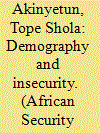

|
|
|
|
|
| Summary/Abstract |
Insecurity is a prominent phenomenon that threatens the peace and development of Africa in general and particularly, the Lake Chad Basin [LCB]. One of the factors driving the menace is the phenomenon of youth bulge. This article argues that young people with poor economic prospects are liable to be recruited for violence. Situated within the grievance model, the article shows how youth make up the larger percentage of protesting, violent and armed groups in the region and presents evidence of how grievance against deprivation moves demography to exacerbate insecurity. The article adopts a qualitative approach and relies on secondary data sourced from briefs, government reports, peer-reviewed journal articles and internet sources. The findings show that the endless supply of children and young people in the LCB is a major factor driving insecurity. By examining the phenomenon of Almajiri, child soldiers and youth radicalisation as enablers of conflict and insecurity in the LCB, the article concludes that population explosion amid a lack of resources leads to grievance and fuels insecurity. This is significant given the paucity of literature on the incidence of demography and insurgency in the LCB; which has become a theatre of insecurity in Africa.
|
|
|
|
|
|
|
|
|
|
|
|
|
|
|
|
| 4 |
ID:
192062
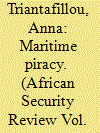

|
|
|
|
|
| Summary/Abstract |
Τhe global economic downturn during the pandemic and the current geopolitical tensions may be marking a resurgence in maritime piracy, rendering close examination of its determinants useful for the international shipping industry and for policymakers. We contribute to pertinent literature by focusing on legal factors that affect sea piracy in Nigeria and Somalia, two countries that feature prominently among the traditional piracy hotspots of West and East Africa respectively. Using data for the period 2002–2020 and panel estimation, we assert prior research by finding institutional factors, mainly corruption, and socioeconomic factors, notably youth unemployment, being conducive to maritime piracy. Specifically, we find institutional factors to be more important for Nigeria, while socioeconomic factors to stand out in the case of Somalia. The results obtained confirm our key hypothesis that in both cases examined pirates have a preference to attack ships with Western European countries’ flags, where legislation tends to be less severe in terms of punishment for the crime of maritime piracy. Our findings support the argument that to discourage pirates from exploiting differences in national legal frameworks worldwide, deterrence of maritime piracy needs to be coordinated at the international level.
|
|
|
|
|
|
|
|
|
|
|
|
|
|
|
|
| 5 |
ID:
192065
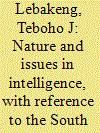

|
|
|
|
|
| Summary/Abstract |
In the realm of security, intelligence remains a critical component. This is because the role of intelligence in statecraft is crucial in providing intelligence information in the advancement of state, national and human security. When the intelligence service of a nation has fault-lines, this critical role can be severely hampered and undermined. However, given the nature of intelligence work any assessment of intelligence services and their role is bedevilled by several factors which makes it difficult even at the best of times for the public to appreciate it. Considering the above, the central question is: How do we make reasonable and grounded conclusions on the efficacy and effectiveness of the South African civilian intelligence service, the State Security Agency? In this article, an argument is advanced that given the current political environment in South Africa, peripheral factors such as ‘the politics around intelligence’ and ‘intelligence around politics’ have created a picture of dysfunction which is not grounded in reality. This analytical article is grounded in autoethnography given the positionality of the author as a former insider and also draws from primary and secondary desktop material. The theoretical underpinning/ungirding this work is institutional autonomy.
|
|
|
|
|
|
|
|
|
|
|
|
|
|
|
|
| 6 |
ID:
192060
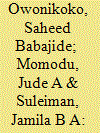

|
|
|
|
|
| Summary/Abstract |
Sexual violence cases in Adamawa State have been frequently reported. Yet, the interrogation of the phenomenon has not received adequate scholarly attention. Unfortunately, unusual high incidents of rape were recorded in the state in 2020 prompting an examination of the trend and pattern of incidents of rape in the state. Data were collected from police records of incidents of rape and interviews were granted to perpetrators, police officers and parents/guardians of victims. The study shows that the highest cases of rape were recorded in July, and Yola North Local Government Area of the state recorded the highest number of incidents of rape. All the perpetrators are male whose ages are within the range of 18 and 33 years while the majority of the victims are female, mostly minors. Covid-19 outbreak and the containment mechanisms employed in the state were the major factors in the escalation of rape cases. The lockdown policy of the state created situations like loss of jobs, dwindling economic resources and shut-down of state apparatuses of security especially the police which increased motivations for offenders to commit the crime of rape as well as contributed to the vulnerability of the victims of rape.
|
|
|
|
|
|
|
|
|
|
|
|
|
|
|
|
|
|
|
|
|